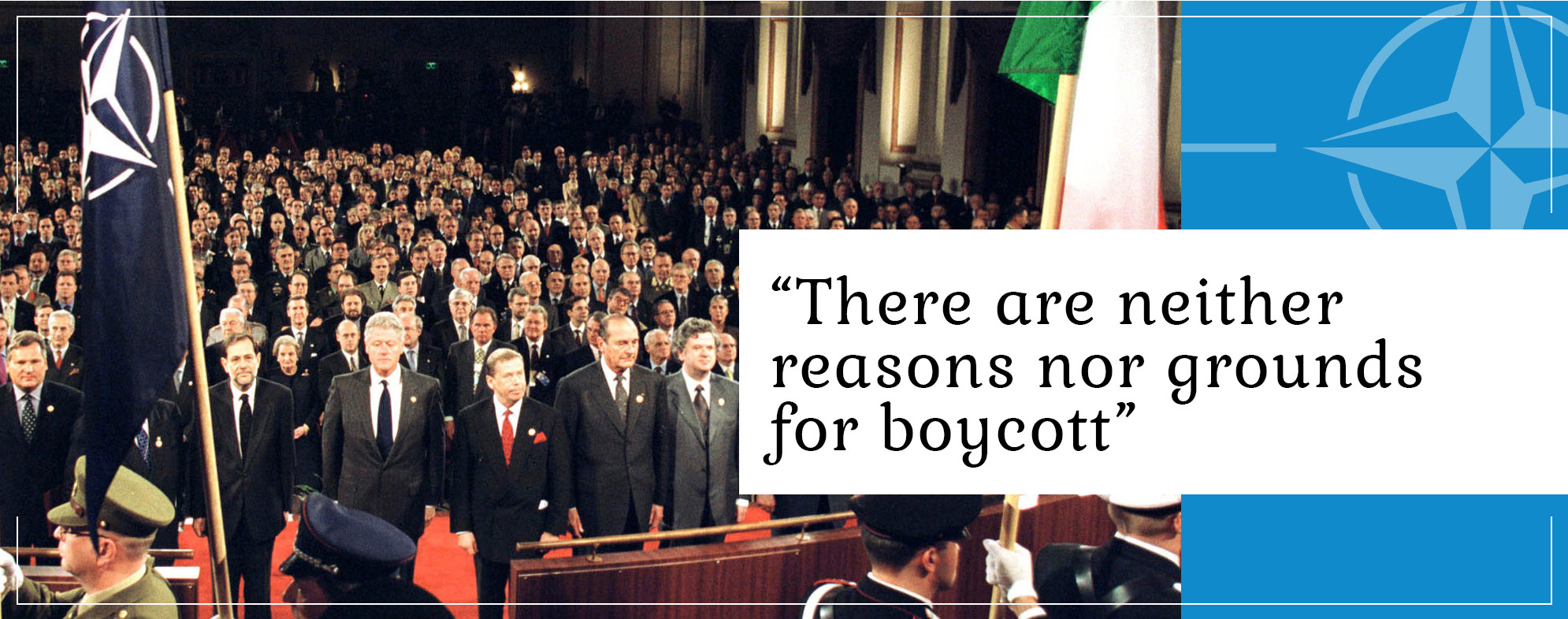
NATO summit, dedicated to 50th anniversary of establishment of the North-Atlantic Treaty Organization, and the session of Euro-Atlantic Partnership Council (EAPC) took place in Washington on April 25, 1999.
In his speech at the session of EAPC President of Armenia Robert Kocharyan, in particular, stated:
“It is obvious that the world has changed with conclusion of the Cold War, and the consistently efficient concept of European security, based on already different perquisites, will de facto change and is already changing. It is also obvious that the new code of relations cannot be defined concretely without taking into consideration the changes in process on the planet. The truth is that NATO, having become the prevailing force in Europe, determines its strategy, stresses the new circle of authority, which also implies new circle of responsibility in case of possible appearance of new separating lines in Europe.
This is a subject of special concern for us, since being a small country located in a complex region we may find ourselves in a new community of global confrontation. It seems to me that such a prospect concerns many countries, and they should do everything possible to avoid such development of events. Until that, it is necessary to formulate and realize new approaches: approaches, in case of which force would not substitute search of compromise, membership in NATO would not determine rights for permissiveness and opportunity to apply double standards in the process of the new strategy realization.”

Sergey Badalyan, leader of Communist Party of Armenia, described Robert Kocharyan’s visit to Washington as “treason to the ally relations of Armenia with Russia, betrayal of the national and state interests of the republic.” He noted then that “the visit to Washington takes place in a period, when Russia has broken off all relations with NATO, when at the instance of the Armenian side Russia strengthens its military presence in Armenia and equips its military base here with modern armament.”

Returning from Washington Robert Kocharyan expressed conviction that his participation in NATO summit could not have affected relations between Armenia and Russia, which had strategic importance.
“The refusal to visit Washington would be equivalent to its boycott, for which there are neither grounds, nor reasons,” Armenian president stated, noting that his participation in NATO summit was “an important and necessary step.”
In July 1999 Robert Kocharyan said in an interview with Mediamax that the South Caucasus could not become a zone of NATO military presence in the foreseeable future.

Summit in Washington took place against the background of NATO interference in the situation in former Yugoslavia, and in 1999 Azerbaijan’s representatives repeatedly tried to draw parallels in this or that form with the problem of Nagorno-Karabakh.
Commenting on these efforts, Minister of Foreign Affairs of Armenia Vartan Oskanian stated that during the meeting between Robert Kocharyan and NATO Secretary General Javier Solana, which had taken place in Brussels in June, the Head of the Alliance had definitely stated that NATO was not going to interfere in the settlement of the Karabakh conflict.

Minister of Foreign Affairs of Armenia also said that after Kosovo events an illusion was created, according to which if NATO participated in the settlement of Karabakh conflict, it would defend the interests of Azerbaijan.

“The situation is really very similar; however there is a significant difference between Kosovo and Karabakh: our Liberation Army turned out to be far stronger. We managed to independently withstand the ethnic cleansings and did what now NATO is trying to do in Kosovo,” Armenian foreign minister noted then.
Ara Tadevosyan
Photos by REUTERS were used in this chapter.



